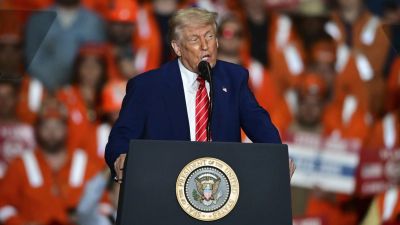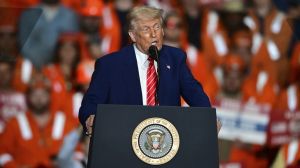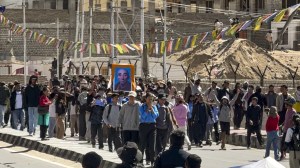Friendship with US in our interest? Yes, says urban India, Pak no
While the Prime Minister’s statement to the Lok Sabha invited posterity and future generations to judge the value of the Indo-US deal o...

While the Prime Minister’s statement to the Lok Sabha invited posterity and future generations to judge the value of the Indo-US deal on Civil-Nuclear Energy Cooperation, the timing and the tone of the statement reflected due concern for the judgement of the existing generation. In this he shares a dilemma that General Pervez Musharraf has faced in the last few years: how far is too far in cosying up to the US? Both Indian and Pakistani rulers have worried about public reaction to their ever-expanding engagements with the US. The Indian Express-Dawn News-CNN-IBN-CSDS poll quizzed a sample of urban Indians and Pakistanis to get a sense of how they view the US and its role in the region.
The good news for the Prime Minister is that among the urban Indians the supporters of the Indo-US deal clearly outnumber the opponents. Among the 2000-plus respondents interviewed in the 20 Indian cities, there were 20 per cent informed supporters (who had heard about and supported the deal) as against only 10 per cent informed opponents. Another 12 per cent offered indirect support, for they believe that the government is the best judge of foreign policy matters. At least in the big cities, the supporters of the deal outnumbered the opponents by three to one. This is so not just among Congress supporters but also among the BJP supporters. The less educated are no less supportive than the more educated, provided they know about this agreement. On this evidence, a political campaign against the deal may not hold out much promise in a country where foreign policy issues do not drive political preferences.
But the Prime Minister would be well advised not to read too much into these figures, for these come with many riders:
• Nearly half the urban population had not even heard of an “Indo-US nuclear deal”. Greater awareness of the deal and more information about its contents could change the balance.
• These opinions could be very fickle. Indians do not hold very strong or stable views on matters of foreign policy and are largely guided by the party they happen to support. Thus what appears a favourable opinion could turn unfavourable if the overall political climate turns unfavourable.
• Those who are less favourably disposed towards the Indo-US deal include the Muslims, who the ruling party is desperately trying to woo.
The poll confirms that the opinion of the urbanites in both the countries still reflect an anti-US mood. There are few takers of the American line on “war against terror” on either side of the Indo-Pak border. Urban Indians and Pakistanis are alike in believing that the US-led “war on terror” is nothing but an excuse for global muscle flexing and in attributing unholy motives to the US role in Afghanistan and Iraq. Even 9/11 fails to arouse much sympathy, with most of the urban Indians and Pakistanis blaming US foreign policy for the attacks. While a majority of the urban Indians (much less in the case of Indian Muslims) who have heard about 9/11 hold al-Qaeda responsible, eight out of nine Pakistanis believe there is no evidence to link al-Qaeda.
Given this perception, it is not surprising that the role of the US in the region is not viewed very positively. The shifting policy of the US in this region has created a paradoxical situation: the Pakistanis are convinced that the US favours India and is no longer their friend, but Indians are yet to be convinced that the US is closer to India than to Pakistan. A majority of Indian respondents and an overwhelming majority of the Pakistani respondents disagree with the proposition that the US is a trusted friend of their country. The urban Indians and well as the urban Pakistanis converge on the belief that the US is neither a friend of India nor that of Pakistan.
What, then, accounts for the approval, even if a mild one, of the Indo-Pak nuclear deal? Clearly, while the distrust and hostility towards the US has not disappeared, there is a new willingness to engage. This willingness is driven by a realisation of the growing presence of the only superpower. About half the urban Indians feel that our government acts in accordance with the wishes of the US. This contributes to a pragmatic desire, expressed by two-thirds of the urban Indians, to be friends with the superpower. Yet the example from across the border shows that “realism” can cut both ways. Three-fourth of the Pakistanis interviewed said their government acted in accordance with the US policy. Yet in Pakistan this realisation appears to have invited a backlash: nearly two-thirds of the urban Pakistanis did not think it was in their interest to be friends with the US.





- 01
- 02
- 03
- 04
- 05


























